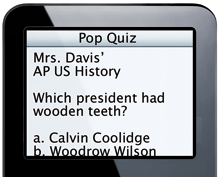Education Tools for iPod

Templates provided include syllabi for college and high school, lecture notes, multimedia presentation, "ESL Listen and Learn," and "radio show." As you create your project, you can click a button to see how it will appear on an iPod, making sure your ideas translate to the small screen. You can attach audio to your lecture notes, so you can "illustrate" your lecture notes rather than just provide an audio version of your lecture. You can also link to the audio of the lecture, though, so you can provide both. But hey, why not have both?? iWriter lets you build multi-page projects, similar to building a multi-page website, and then you can upload to .Mac, or even use the final project as a website of sorts, by posting the pages to your class site.
Talking Panda doesn't disclose pricing or let you download a demo without providing an e-mail address (shame on them!) but at least they promise not to sell your d33ts to someone else. The software is only $30, but you can try it free for 15 days. Cool, huh? Read the full post here ...












